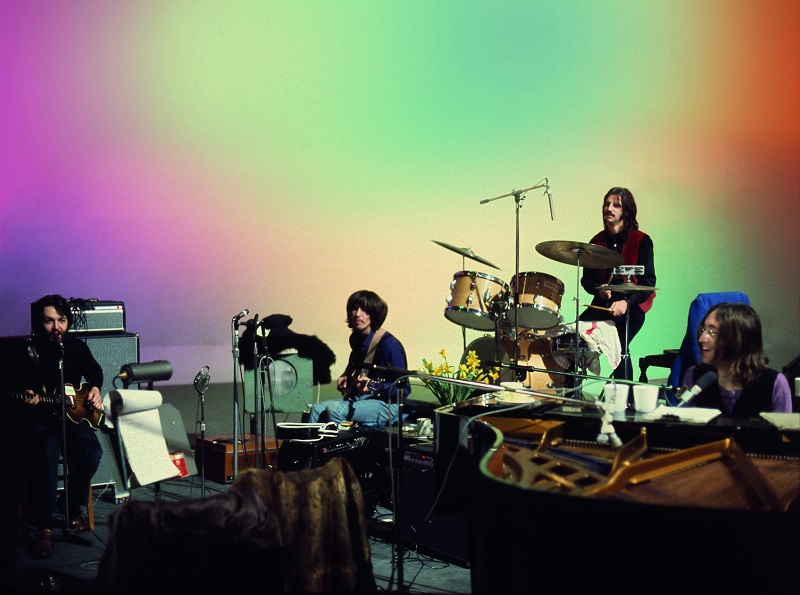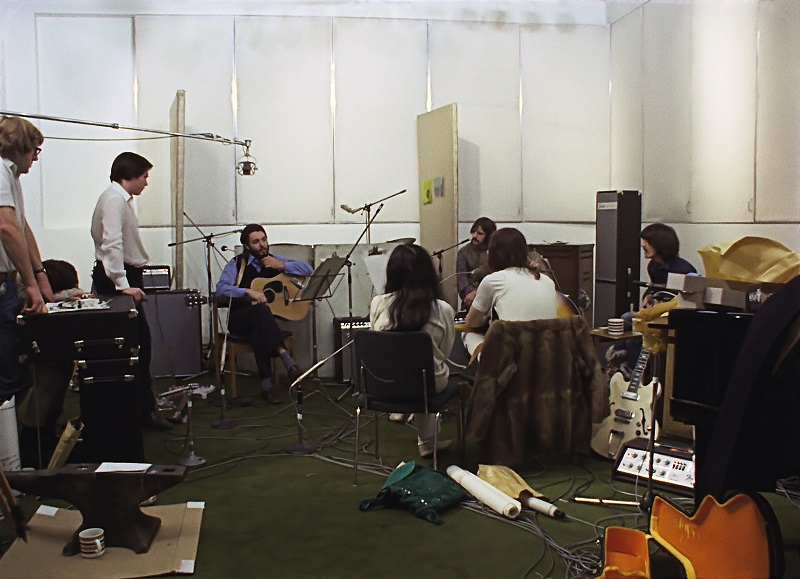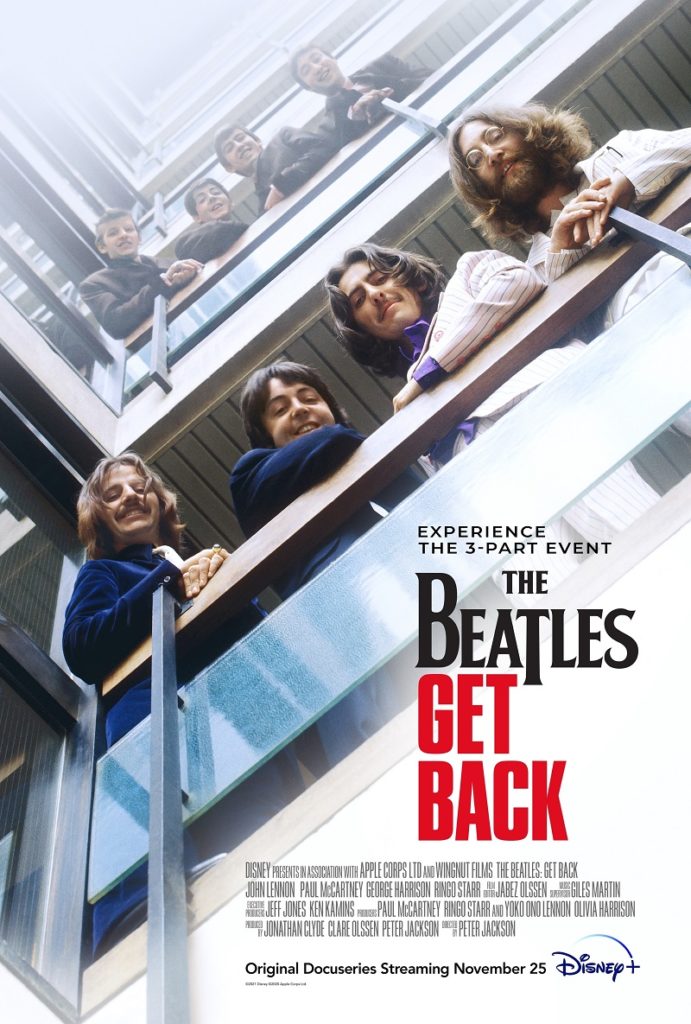Remember that surprise rooftop concert above London’s Savile Row where The Beatles performed Get Back for the first time? It wasn’t only a coming-out party for what would be the Fab Four’s final album, 1970’s Let It Be, as well as the iconic group’s first performance in front of an audience in four years.
What else it was for documentarian Michael Lindsay-Hogg to capture with his lens was an opportunity to bottle lightning with an uncut filming of the historic nature of those final moments of the cultural revolution that was The Beatles. John Lennon, Paul McCartney, George Harrison, and Ringo Starr rocketing out of Liverpool as young lads and then saying goodbye to pop superstardom never before obtained via that surprise performance above that London street as only a fabled institution such as The Beatles could achieve.
Peter Jackson, he of The Lord of the Rings and The Hobbit fame has found a second act as a filmmaker and storyteller involving the non-fiction realm. In 2018 he restored century-old black and white footage of World War I and created They Shall Not Grow Old as a color corrected, sound introduced a tribute to the generation who molded the greatest generation.
The Beatles: Get Back footage looks as stunning as They Shall Not Grow Old did. There is a pop to the colors that captures the lads and their sense of fashion—albeit sometimes casually calculated. There’s a crispness to the material that one would never know that it was from 60-plus years prior and hadn’t been used to its fullest emotive extent. Yes, the footage is from the 1970 film that Lindsay-Hogg produced documentary. What comes through with Jackson upon experiencing the 60 hours of footage and 150 hours of rare Beatles audio, is a different take on the same subject.
There was a popular sentiment that Yoko Ono had broken up The Beatles and that the band simply did not get along during that Get Back recording sessions that would become the Let It Be album. Lindsay-Hogg’s film simply reflected that and gave the public the answer it was looking for from the unconscionable question, “Why would The Beatles break up?”
Jackson saw things differently.
It’s rare that the same base footage would produce such seismically different docs, but what The Beatles: Get Back delivers is a sense that this was the world’s most proficient rock and roll band at the top of their creative and popularity powers who treasured what each member brought to that equation that was their blinding success and exponential admiration that has arisen in the decades since they left that Savile Row rooftop.
A large majority of Jackson’s footage should be described as an optimistic portrayal of four lads who had a run atop the top of the pops unlike anything history has produced and how that may affect the egos, individual interpersonal relationships, and romantic posturing that in the end humanizes this larger-than-life group. Yes, they transcend music. Their lyrics can be seen as the greatest contribution to British literature since that Bard guy filled his Globe Theatre. The musical menagerie—overseen by one of the most gifted music producers of all time in Sir George Martin—came to a musical masterpiece head with Let It Be where one can completely see, thanks to Jackson’s cinematic insight, how does one top that?
Framed splendidly by Jackson with facts, archival live performance footage, and the headlines of the day, The Beatles: Get Back all adds up to a “where do we go from here except our separate ways” conclusion. It’s as if the Fab Four had artistically painted themselves into a corner of virtuosity.
The Beatles: Get Back arrives on Disney+ in the form of a three-part docuseries on November 25 with running times hovering around the two-to-three-hour mark for each. The band had gathered on a film stage with the hopes of recording a TV special in front of a live audience that eventually devolves into what… they don’t know. That is a fascinating aspect of this entire endeavor is that Jackson keeps us guessing—even though we know what happens with that rooftop concert that reverberates throughout rock history to this day.
By its conclusion, the band will have written, rehearsed, and recorded fourteen new songs. Amongst the tracks performed live in front of an audience were instant classics Let It Be, Don’t Let Me Down, I’ve Got a Feeling, and Get Back. The Let It Be album arrived in stores in 1970 after The Beatles had officially called it a day.
Something that came through in that initial The Beatles: Get Back trailer is a proliferation of humor by the band. They’re surprisingly self-deprecating and are, in hindsight, a group of mates who have spent countless hours together for over a decade. So, their comedic camaraderie should hardly be shocking. Yet, the narrative had been established that by the end of the entity that was The Beatles, they could not get along in the least. Over the six-plus hours of Jackson’s documentary, the viewer is treated to a band that keenly knows and wields its power. They are also painfully aware that this is the end of the long and winding road.
A majority of the unexpected blissfulness arrives in the form of literally hours of footage of the band just sitting around as a quartet of old mates, musicians sharing a collective appreciation for one another, and some jam sessions that are epic. Many results in songs we know and love, others descend into pure silliness, done for the purest of joy that is their shared passion for the entity of music.
Also, Lennon is a cad! Longtime fans can probably inform that this writer might seem to have just awoken from a long nap that included missing that part of the majesty that is John Lennon. In all seriousness, the musical mastermind is a hilarious, spontaneous person who spends much of that waiting to record time being the biggest comedic surprise of the entire endeavor. We all know his serious persona and his role in the anti-war movement, but Jackson’s Get Back gives us some sides of Lennon that are supremely goofy and downright silly.
A multitude of the happiest sounds made throughout the entire series is the result of Lennon cracking himself up. There is a pureness to his laughter that reflects a gentleman whose loss to an assassin’s bullet on December 8 of 1980 still cripples us with “what if.”
Much has been made of Harrison leaving the band in the middle of these recordings. Without giving anything away, let’s just say the way that Jackson handles the moments gracefully. They do add up to rock and roll’s finest concluding that they were nearing the time to bow out and Jackson frames it simply… four grown men being honest with one another about things both big and small.
Yet even though the conclusion is pre-written, there is an air of magic to these Fab Four and their musical mastery that continually wins the day. One is constantly left with a sense of Beatles-led optimism. You know the one, a landscape that gifted us Let It Be and All You Need is Love—to name two of too many instant classics.
Grade: A+




